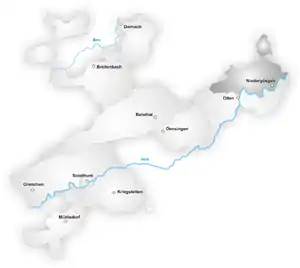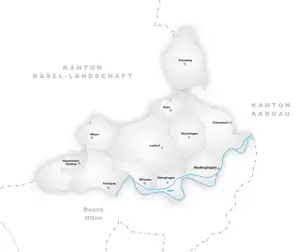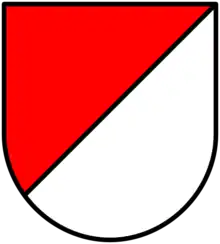_407.JPG.webp)


Gösgen District is one of the ten districts of the canton of Solothurn, Switzerland, situated to the northeast of the canton. Together with the Olten District, Gösgen forms the electoral district of Olten-Gösgen. It has a population of 24,793 (as of 31 December 2020).
Municipalities
Gösgen District contains the following municipalities:
| Coat of arms | Municipality | Population (31 December 2020)[1] |
Area, km2 |
|---|---|---|---|
| Erlinsbach | 3,572 | 8.90 | |
| Hauenstein-Ifenthal | 306 | 5.30 | |
| Kienberg | 503 | 8.53 | |
| Lostorf | 3,963 | 13.27 | |
| Niedergösgen | 3,897 | 4.33 | |
| Obergösgen | 2,359 | 3.63 | |
| Stüsslingen | 1,129 | 8.40 | |
| Trimbach | 6,562 | 7.66 | |
| Winznau | 1,968 | 4.00 | |
| Wisen | 442 | 4.79 | |
| Total | 24,793 | 68.81 |
Mergers and name changes
Geography
Gösgen has an area, as of 2009, of 68.8 square kilometers (26.6 sq mi). Of this area, 28.22 km2 (10.90 sq mi) or 41.0% is used for agricultural purposes, while 29.56 km2 (11.41 sq mi) or 43.0% is forested. Of the rest of the land, 9.84 km2 (3.80 sq mi) or 14.3% is settled (buildings or roads), 1.1 km2 (0.42 sq mi) or 1.6% is either rivers or lakes and 0.08 km2 (20 acres) or 0.1% is unproductive land.[4]
Of the built up area, housing and buildings made up 7.7% and transportation infrastructure made up 3.4%. while parks, green belts and sports fields made up 1.3%. Out of the forested land, 40.6% of the total land area is heavily forested and 2.3% is covered with orchards or small clusters of trees. Of the agricultural land, 37.2% is used for growing crops, while 2.0% is used for orchards or vine crops and 1.8% is used for alpine pastures. All the water in the district is flowing water.[4]
Coat of arms

The blazon of the municipal coat of arms is Per bend sinister Gules and Argent.[5]
Demographics
Gösgen has a population (as of December 2020) of 24,793.[1]
Most of the population (as of 2000) speaks German (19,540 or 88.0%), with Italian being second most common (798 or 3.6%) and Serbo-Croatian being third (390 or 1.8%). There are 130 people who speak French and 24 people who speak Romansh.[6]
As of 2008, the gender distribution of the population was 49.6% male and 50.4% female. The population was made up of 8,779 Swiss men (38.0% of the population) and 2,677 (11.6%) non-Swiss men. There were 9,378 Swiss women (40.6%) and 2,275 (9.8%) non-Swiss women.[7] Of the population in the district, 6,589 (29.7%) were born in Gösgen and lived there in 2000. There were 4,719 (21.2%) who were born in the same canton, while 6,614 or 29.8% were born somewhere else in Switzerland, and 3,703 (16.7%) were born outside of Switzerland.[6]
In 2008 there were 122 live births to Swiss citizens and 54 births to non-Swiss citizens, and in same time span there were 170 deaths of Swiss citizens and 17 non-Swiss citizen deaths. Ignoring immigration and emigration, the population of Swiss citizens decreased by 48 while the foreign population increased by 37. There were 33 Swiss men and 21 Swiss women who immigrated back to Switzerland. At the same time, there were 103 non-Swiss men and 48 non-Swiss women who immigrated from another country to Switzerland. The total Swiss population change in 2008 (including moves across municipal borders) was an increase of 103 and the non-Swiss population increased by 139 people. This represents a population growth rate of 1.1%.[8]
As of 2000, there were 8,914 people who were single and never married in the district. There were 11,018 married individuals, 1,281 widows or widowers and 998 individuals who are divorced.[6]
There were 2,686 households that consist of only one person and 676 households with five or more people. Out of a total of 9,196 households that answered this question, 29.2% were households made up of just one person and 81 were adults who lived with their parents. Of the rest of the households, there are 2,733 married couples without children, 3,008 married couples with children There were 438 single parents with a child or children. There were 118 households that were made up unrelated people and 132 households that were made some sort of institution or another collective housing.[6]
The historical population is given in the following chart:[9]

Politics
In the 2007 federal election, the most popular party was the SVP, which received 30.41% of the vote. The next three most popular parties were the CVP (19.78%), the SP (19.43%) and the FDP (18.24%). In the federal election, a total of 7,630 votes were cast, and the voter turnout was 51.6%.[10]
Religion
From the 2000 census, 10,244 or 46.1% were Roman Catholic, while 5,991 or 27.0% belonged to the Swiss Reformed Church. Of the rest of the population, there were 351 members of an Orthodox church (or about 1.58% of the population), there were 264 individuals (or about 1.19% of the population) who belonged to the Christian Catholic Church, and there were 445 individuals (or about 2.00% of the population) who belonged to another Christian church. There were 15 individuals (or about 0.07% of the population) who were Jewish, and 1,304 (or about 5.87% of the population) who were Islamic. There were 70 individuals who were Buddhist, 85 individuals who were Hindu and 17 individuals who belonged to another church. 2,835 (or about 12.76% of the population) belonged to no church, are agnostic or atheist, and 590 individuals (or about 2.66% of the population) did not answer the question.[6]
Weather
Gösgen has an average of 127.9 days of rain or snow per year and on average receives 930 mm (37 in) of precipitation. The wettest month is June during which time Gösgen receives an average of 108 mm (4.3 in) of rain or snow. During this month, there is precipitation for an average of 12.4 days. The month with the most days of precipitation is May, with an average of 12.6, but with only 87 mm (3.4 in) of rain or snow. The driest month of the year is October with an average of 60 mm (2.4 in) of precipitation over 8.1 days.[11]
Education
In Gösgen, about 8,667 or (39.0%) of the population have completed non-mandatory upper secondary education, and 2,238 or (10.1%) have completed additional higher education (either University or a Fachhochschule). Of the 2,238 who completed tertiary schooling, 68.3% were Swiss men, 20.1% were Swiss women, 7.9% were non-Swiss men and 3.8% were non-Swiss women.[6]
References
- 1 2 "Ständige und nichtständige Wohnbevölkerung nach institutionellen Gliederungen, Geburtsort und Staatsangehörigkeit". bfs.admin.ch (in German). Swiss Federal Statistical Office - STAT-TAB. 31 December 2020. Retrieved 21 September 2021.
- ↑ Nomenklaturen – Amtliches Gemeindeverzeichnis der Schweiz (in German) accessed 4 April 2011
- ↑ "Applikation der Schweizer Gemeinden". bfs.admin.ch. Swiss Federal Statistical Office. 2021. Retrieved 14 January 2021.
- 1 2 Swiss Federal Statistical Office-Land Use Statistics 2009 data (in German) accessed 25 March 2010
- ↑ Flags of the World.com accessed 15-March-2011
- 1 2 3 4 5 6 STAT-TAB Datenwürfel für Thema 40.3 - 2000 Archived 2014-04-09 at the Wayback Machine (in German) accessed 2 February 2011
- ↑ Canton of Solothurn Statistics - Wohnbevölkerung der Gemeinden nach Nationalität und Geschlecht Archived 2011-03-05 at the Wayback Machine (in German) accessed 11 March 2011
- ↑ Swiss Federal Statistical Office - Superweb database - Gemeinde Statistics 1981-2008 (in German) accessed 19 June 2010
- ↑ Swiss Federal Statistical Office STAT-TAB Bevölkerungsentwicklung nach Region, 1850-2000 Archived 2014-09-30 at the Wayback Machine (in German) accessed 29 January 2011
- ↑ Swiss Federal Statistical Office, Nationalratswahlen 2007: Stärke der Parteien und Wahlbeteiligung, nach Gemeinden/Bezirk/Canton (in German) accessed 28 May 2010
- ↑ "Temperature and Precipitation Average Values-Table, 1961-1990" (in German, French, and Italian). Federal Office of Meteorology and Climatology - MeteoSwiss. Archived from the original on 27 June 2009. Retrieved 8 May 2009., the Gösgen weather station elevation is 380 meters above sea level.